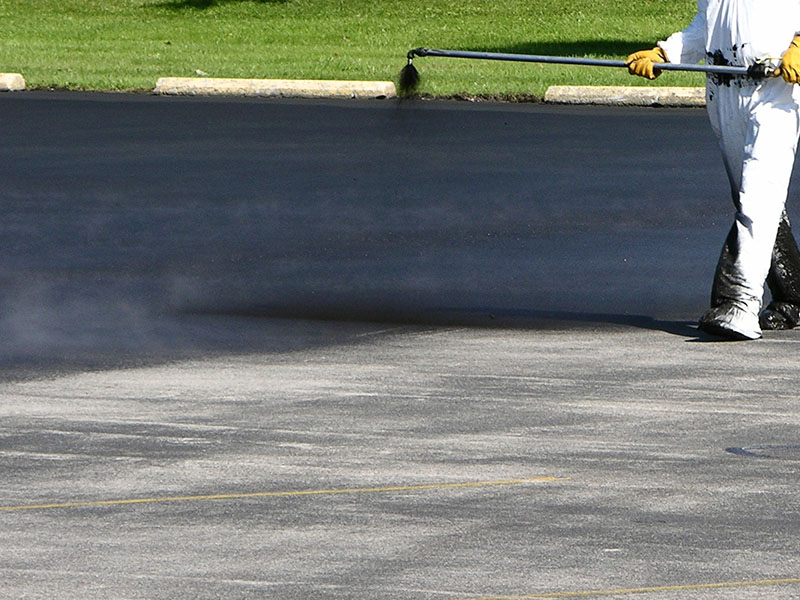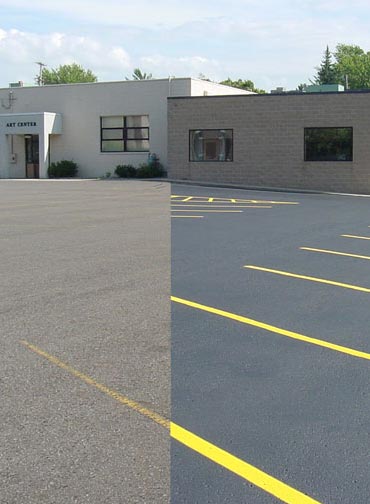
(Updated Aug 2025)
Seal Coating – Why It Matters for Every Driveway or Parking Lot
If you’ve invested in a new asphalt surface, whether it’s a residential driveway or a commercial parking lot, you want it to last—and look great while doing so. That’s where seal coating asphalt comes in. But what are the benefits of seal coating asphalt? It isn’t just a finishing touch–it’s a protective layer that guards your pavement against the elements, wear, and time.
In this guide, we’ll walk through what seal coating is, why it matters, how often it should be done, and how it fits into your overall pavement maintenance strategy.
What Is Seal Coating Asphalt?
Seal coating is the process of applying a protective sealant over an existing asphalt surface. The sealcoat product acts as a barrier, shielding the asphalt from UV rays, moisture, chemicals, and general wear and tear.
- Typically made from coal tar, asphalt emulsions, or acrylics
- Applied using brushes, squeegees, or spray equipment
- Dries to a deep black finish that refreshes appearance and provides protection
While it won’t repair serious damage, sealcoating helps prevent cracks, fading, and erosion before they start.
What are the Benefits of Seal Coating Asphalt?
If you’re on the fence about whether sealcoating is necessary, think of it this way: asphalt is an investment—and like anything exposed to weather, traffic, and time, it needs protection. Sealcoating is a small upfront cost that pays off in long-term durability, appearance, and lower maintenance.
Below, we’ll break down the key benefits of seal coating asphalt and why it should be part of every pavement care plan.
1. Extends the Life of Your Asphalt Surface
 One of the most compelling reasons to apply a sealcoat is longevity. Sealcoating slows the natural aging process of asphalt pavement by shielding it from damaging elements.
One of the most compelling reasons to apply a sealcoat is longevity. Sealcoating slows the natural aging process of asphalt pavement by shielding it from damaging elements.
- Protects against oxidation from sun exposure
- Reduces damage from water infiltration
- Resists chemical spills like oil, gas, and de-icers
With regular asphalt sealing, your driveway or parking lot can last significantly longer—sometimes doubling the lifespan compared to unsealed surfaces.
2. Enhances Curb Appeal
A freshly sealed asphalt surface has a rich, dark finish that makes your property look well-maintained and professional.
- Gives a clean, uniform look to faded pavement
- Makes a positive first impression for homes and businesses
- Visibly boosts the perceived value of your property
Whether you’re welcoming guests, clients, or potential buyers, appearance matters.
3. Improves Safety and Functionality
Sealcoating isn’t just about looks—it also improves usability and safety.
- Smooths minor surface imperfections for safer walking and driving
- Increases skid resistance for both pedestrians and vehicles
- Enhances visibility for striping and line markings
For parking lots in particular, this can reduce liability risks and make navigation easier for customers and staff.
4. Helps Prevent Cracks and Water Damage
When water seeps into asphalt, it softens the base and causes expansion during freeze-thaw cycles. Sealcoating creates a moisture barrier to help prevent this.
- Fewer cracks mean less need for expensive repairs
- When cracks do form, sealcoating makes it easier for crack filler to bond properly
- Stops potholes from forming by keeping the base intact
Maintenance is always easier—and cheaper—than reconstruction.
5. Makes Maintenance Easier
A sealed surface is smoother, darker, and less porous than untreated asphalt, making routine maintenance faster and more effective.
- Sweeping is easier thanks to fewer bumps and loose gravel
- Oil stains can be cleaned more easily
- Sealcoating reduces dust and debris buildup
This helps you preserve a clean, professional look with minimal effort.
6. Provides a Cost-Effective Layer of Protection
 Sealcoating is relatively inexpensive compared to full resurfacing or reconstruction. When applied on a proper schedule, it dramatically reduces the need for major repairs.
Sealcoating is relatively inexpensive compared to full resurfacing or reconstruction. When applied on a proper schedule, it dramatically reduces the need for major repairs.
- Acts like sunscreen for your asphalt surface
- Protects your investment at a fraction of the replacement cost
- Recommended every 2–3 years, depending on traffic and weather conditions
Think of it as preventative care for your driveway or parking lot.
When Should You Sealcoat Asphalt?
- New pavement should be sealed after 6–12 months to allow for proper curing
- Older pavement should be resealed every 2–3 years, or when it begins to look dry or faded
- Avoid sealcoating in extreme heat, cold, or rain
It’s important to start sealcoating before major damage occurs—if you’re already seeing cracks, potholes, or raveling, additional repair steps will be needed first.
How Sealcoating Fits Into Asphalt Maintenance
Sealcoating is one of several tools in a good maintenance plan. Combined with crack filler, patching, and occasional resurfacing, it helps you avoid major reconstruction projects.
A well-rounded maintenance schedule might look like this:
- Annually: Clean debris, inspect for damage, apply crack filler
- Every 2–3 years: Apply a fresh asphalt sealer
- Every 8–15 years: Consider resurfacing your parking lot or driveway if wear is significant
Stay proactive, and your pavement will reward you with long-lasting performance.
FAQs: What are the Benefits of Seal Coating Asphalt?
- Does sealcoating fix cracks or potholes?
No. Sealcoating prevents damage, but any existing cracks or holes should be repaired first with crack filler or patching materials. - Can I sealcoat asphalt myself?
DIY sealcoating is possible but requires time, proper tools, and understanding of the process. For best results, professional application is recommended. - How long does sealcoating take to dry?
Most sealcoats dry to the touch within 4–8 hours but require 24–48 hours before vehicles can drive on them. Weather conditions can affect drying time. - Will sealcoating make my surface slippery?
Not if done correctly. Sealcoating actually improves traction by filling in small surface flaws and creating a uniform texture. - What time of year is best for sealcoating?
Late spring through early fall is ideal, when temperatures are consistently above 50°F and rain is less frequent.
Protect Your Asphalt the Smart Way
Whether you’re managing a parking lot or caring for your own driveway, regular asphalt sealing is one of the smartest ways to extend the life of your surface and keep it looking its best.
William Stanley & Sons Paving brings decades of experience to every project, helping homeowners and businesses maintain their asphalt with precision, care, and the right materials for long-term durability.
Ready to protect your pavement? Contact us today for a free estimate on professional sealcoating services.
